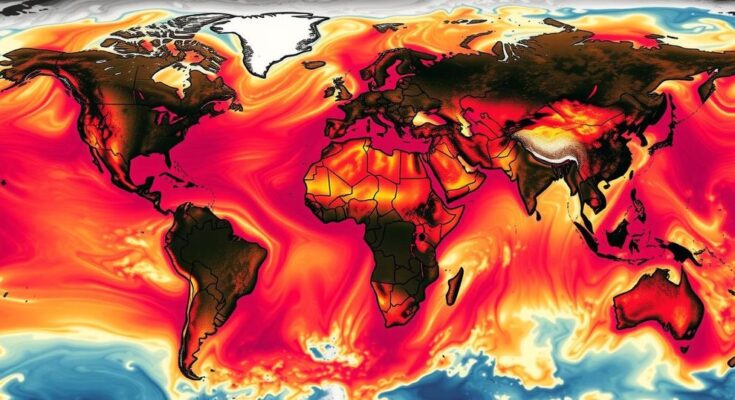In 2024, global temperatures reached an unprecedented high, marking the hottest year on record for land and oceans, as confirmed by U.S. scientists. The worldwide average temperature was significantly above pre-industrial levels, and extreme weather events were noted globally. Experts emphasize the urgent need for action to mitigate climate impacts and adhere to international climate targets, with claims that the situation requires immediate attention from world leaders.
According to United States government scientists, 2024 has been confirmed as the hottest year recorded for the world’s land and oceans, marking a significant milestone in the context of the ongoing climate crisis. The National Oceanic and Atmospheric Administration (NOAA) reported that the global average temperature was 1.46°C (2.6°F) warmer than pre-industrial levels, indicating alarming trends in climate fluctuations. This year was 0.1°C (0.18°F) above the previous record set in 2023, underscoring a concerning pattern whereby all ten of the hottest years recorded since 1850 have occurred within the last decade.
The increased temperatures correlate with the findings released by European scientists, which highlighted that 2024 was 1.6°C (2.8°F) warmer than pre-industrial levels. This finding represents the first time temperatures have surpassed the internationally-agreed target of limiting the increase to below 1.5°C (2.7°F), further emphasizing the urgency of addressing climate change. NASA’s data supports these conclusions, corroborating that 2024 was indeed a record-setting year with temperatures 1.47°C (2.6°F) higher than those prior to industrialization. Gavin Schmidt, a senior climate scientist at NASA, stated, “All the groups agree, regardless of how they put the data together, there’s no question. The long-term trends are very clear.”
The impact of these rising temperatures has been felt globally, with the United States, Europe, and Africa all experiencing record heat. The Arctic region is warming at three times the global average. The year was notable for extreme weather events, evidenced by unusual occurrences such as howler monkeys falling from trees in Mexico due to severe heat, devastating hurricanes in the southeast United States, and unprecedented flooding in Spain. Notably, Southern Africa reported only half of its normal rainfall.
The oceans have similarly recorded soaring temperatures, absorbing much of the heat produced by human activities. Scientists are now investigating other potential factors contributing to this accelerated warming, beyond human impact and periodic El Niño events. Robert Rohde, lead scientist at Berkeley Earth, stated that the unprecedented temperature increases are evidence that global warming is accelerating unexpectedly.
Despite a single year surpassing the 1.5°C threshold not nullifying commitments made under the Paris Climate Agreement, many experts believe the goal is effectively unattainable. António Guterres, Secretary-General of the United Nations, emphasized the necessity for immediate action, stating, “Blazing temperatures in 2024 require trail-blazing climate action in 2025. There’s still time to avoid the worst of climate catastrophe. But leaders must act – now.”
The continuous failure of governments to effectively reduce greenhouse gas emissions highlights the seriousness of the climate crisis, mirroring the devastating wildfires currently plaguing Los Angeles. Immediate and effective action is paramount to mitigate further environmental damage and to safeguard against worsening climate impacts.
The ongoing climate crisis has resulted in unprecedented temperature increases across the globe, prompting concerns from scientists and government officials alike. The data indicating that 2024 was the hottest year on record not only highlights the extraordinary warming trends but also signifies the increased frequency of extreme weather events. Research from reputable institutions such as NOAA and NASA points to a systematic failure by governments to adhere to climate commitments that aim to limit global warming, reflecting a critical need for decisive action against climate change.
The confirmation of 2024 as the hottest year on record for both land and oceans serves as a stark warning regarding the effects of climate change. With temperatures rising significantly above pre-industrial levels, critical global thresholds have been crossed, demanding urgent and comprehensive climate action. The implications of such warming are profound, affecting ecosystems, weather patterns, and human populations worldwide. A collective response from governments and leaders is necessary to address this emergent crisis and work towards environmental resilience and sustainability.
Original Source: www.theguardian.com




